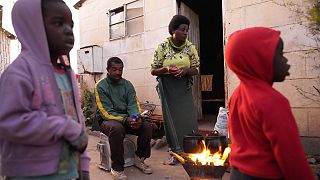Zimbabwe
Girls in rural Zimbabwe are forced to use cow dung for sanitary wear as inflation hits feminine hygiene products.
Constance Dimingo, 19, wriggles in her wheelchair as she tries to remember the last time, she used a sanitary pad. “I last wore a pad before my mother died last year,” she laments.
A congenital physical disability compounded by poverty has made a natural monthly cycle a period of shame.
“Now, I have to use anything I can find, cow dung, leaves, newspapers and clothes, to stop the blood from leaking. I wish my mother was still alive to buy me pads and medication for my menstrual pain,” she concludes.
Constance is one of the 72% of girls located in the rural town of Domboshava, 30 km north of the capital Harare who do not have access to commercial sanitary wear, according to a study by SNV Netherlands Development Organisation in Zimbabwe.
For an equivalent of US$2, sanitary pads are beyond reach for most of the country’s 3 million menstruating girls, who live below the poverty datum line.
Constance, her epileptic sister and three other girls rely completely on the assistance of their visually impaired grandmother to manage their menstrual hygiene during that time of the month.
Six females, three disabilities and one bloody mess.
“Sanitary pads are a luxury I cannot afford for my girls,” grandmother Vhene Gumedhe shares, explaining how the cow dung process works.
“I take the dung, mould it and leave it to dry so that it easily absorbs the blood. The girls do not put the cow pattie directly on the skin. I wrap many clothes over it to avoid itching when placed on the underwear. Then I show them how to close their private parts to block the bleeding.”
She concludes, “The girls have heavy flows with cycles that typically last six days. We prefer this method because cow patties soak up a lot of blood. Once soaked, we dispose of it privately by burying it in the ground. Our Shona culture does not allow that men see such things.”
This family’s story mirrors that of millions of impoverished women around the Southern African nation who have resorted to desperate methods to manage their periods.
According to the Ministry of Women and Youth Affairs, 67% of girls miss school during menstruation due to a lack of access to sanitary products and clean sanitation facilities. Girls with disabilities usually drop out of school altogether, as was the case with Constance.
Apart from missing school, health experts say these methods are breeding grounds for salmonella, E. Coli and several bacteria that can result in reproductive health infections.
“The girls complain of itching and burning sensations in the vagina. When examined at the hospitals, we notice yeast infections, urogenital tract infections and early signs of cervical cancer due to insertion in the vaginal tract.” shares Theresa Nkhoma, Community Childcare Worker under the Ministry of Public Service, Labour and Social Welfare.
“We are advocating for the ladies to receive sewing machines in the villages so they can learn to make reusable pads.” the health worker proposes.
The government of Zimbabwe has made efforts to ease the situation by scrapping taxes on all sanitary products. But period poverty is being exacerbated by inflation standing at over 191.6%, according to the Zimbabwe National Statistics Agency.
Families have to choose between purchasing feminine hygiene products and buying food, with most settling on the latter.
Living on less than a dollar a day, pads remain a frill for Constance and her sisters who continue to bear the brunt of Zimbabwe’s economic crisis.












Go to video
Zimbabwe court rejects opposition bid to block Gukurahundi massacre hearings
Go to video
Paraguayan town celebrates vibrant Kamba Ra'anga festival with masks, fire and tradition
02:19
South African actor Embeth Davidtz makes directorial debut with Rhodesia-set drama
Go to video
World leaders confront gap between rich and poor at Financing for Development meeting
01:46
Poverty drives instability, conflict - UN chief
01:47
Chinese city of Xuchang is world's biggest producer of wigs